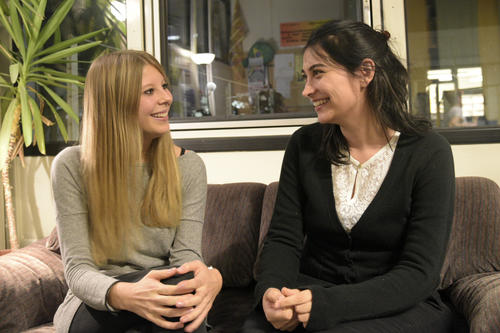“Talk to you next time!”
Syrian-German language tandem at Freie Universität: Rojina Issa and Katharina Kuhnert are teaching each other their native languages
Dec 02, 2015
Language learning at the student café: Rojina and Katharina have been meeting regularly since early October to chat – and teach each other their native languages.
Image Credit: Annika Middeldorf
“You definitely have to hear Mashrou Leila’s music,” Rojina says. “They’re a Lebanese band, great music in Arabic.” Katharina nods and repeats the band’s name: “I’ll check it out!” The pair offer a different view of what language learning can look like: Rojina Issa, who is from Syria, and Berlin native Katharina Kuhnert talk about pop music and TV shows and whatever else is on their minds. And along the way, each of them improves her language skills in the other’s native language.
Rojina and Katharina have formed a language tandem since early October. Once a week, the two students of Islamic studies meet at a student café in the Silberlaube building. Katarina, who is in her third semester in the program, takes a Standard Arabic language class that meets four times a week. “Because we will be working a lot with original sources like the Koran in the higher semesters, we need to have a good grasp of the language. But no one speaks Standard Arabic in their everyday life. That’s one reason I wanted to have a tandem partner,” she says. Rojina, for her part, doesn’t need a class in Arabic – after all, it’s her native language. “But I wanted to improve my German,” she says. The two students sit down together for one or two hours at a time, speaking German half the time and then spending the other half on Standard Arabic or the Syrian dialect.
Happy That the Family Is Well
Rojina came to Germany from Syria a bit more than two years ago to start a degree program in Berlin. Now 32, she has been studying Islamic studies at Freie Universität since October. Her family lives in a safe part of the country, she says, on the Syrian coast near the city of Tartus. “If they didn’t watch the news, they could almost forget that the country is at war,” she explains. Her sister moved to Berlin several years ago. Rojina herself was still studying library science in Damascus at the time, and she experienced the start of the civil war in the Syrian capital in early 2011. She talks to her family on the phone every day and is happy that everyone is doing well.
Alongside their degree program, the two young women have something else in common: They are both involved in helping refugees. Rojina works as a social assistant at an initial processing point, and Katharina works with a nonprofit called multitude e.V., an initiative that offers free German language classes to refugees in Berlin. She takes care of children while their parents are working hard to learn German. “There’s a lot of gesturing and hand signs, but it’s amazing how fast the kids learn new words, even just when they’re playing. And my Arabic is helpful, too,” she explains.
Learning German with Tatort
During their weekly meetings, the two students talk about everything that interests them – there’s no specific curriculum. The subjects suggest themselves. Rojina did not start learning German until she had arrived in Germany. “TV shows really helped me learn German. I was totally hooked,” she says. At the start, it was arguably the most German of all German shows that pulled her in: Tatort, a hugely popular weekly crime drama. Nowadays, she also watches Danish and American programs dubbed into German. And Katharina, too, is shifting to watching TV in Arabic, although it isn’t always easy: “I’m always super happy if I understand even a little bit.” Whether Rojina will stay in Germany or go back to Syria at some point is still undecided, she says: “For now, I’m just focusing on my studies.”
Further Information
As part of the Welcome to Freie Universität Berlin program, the university is offering one-day preparatory classes in teaching German as a foreign language for members of the university community who wish to work with refugees on a volunteer basis to help them learn German.
The first workshops will be on December 4, 2015, and December 12, 2015, both from 10 a.m. to 6 p.m.
For more information about the program, see the website.
More information about tandem partnerships: www.sprachenzentrum.fu-berlin.de/slz/tandem

